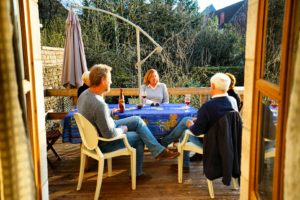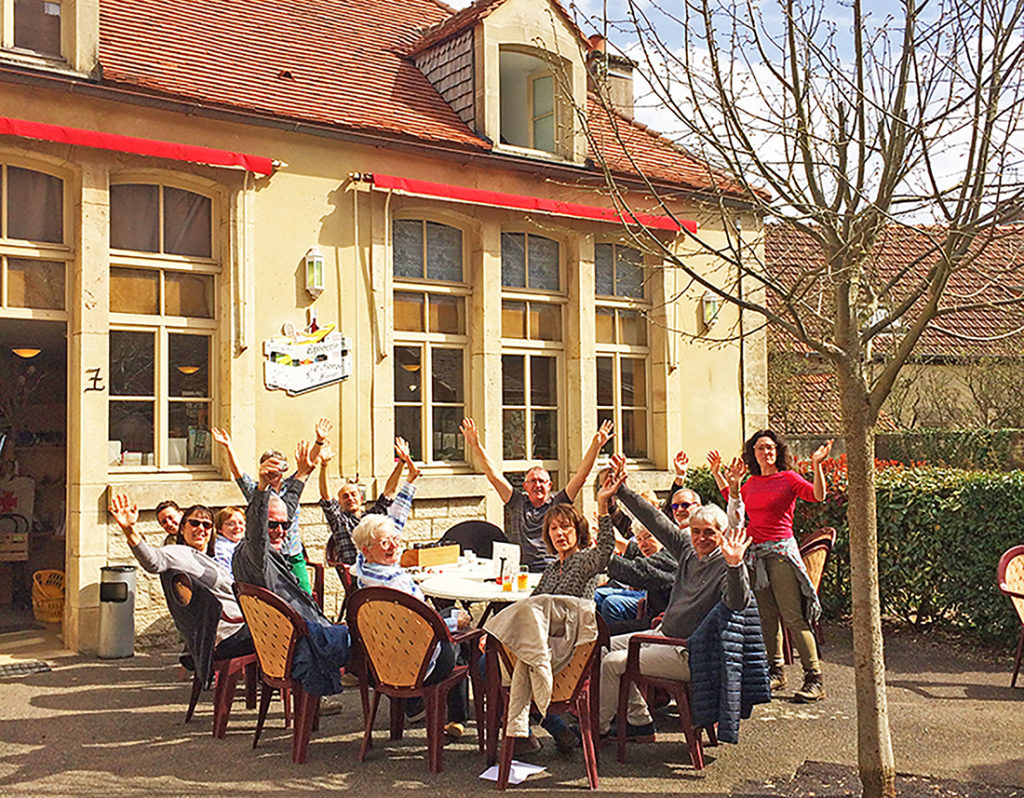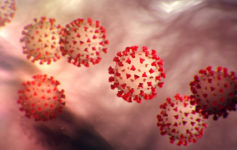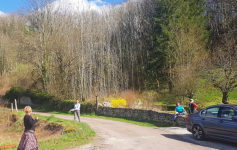This morning at the weekly Sunday gathering on the terrace at the épicerie, we sat in the springtime sunshine with about 20 of our neighbors and friends, enjoying the long-awaited warmth and light. Everyone gathered in a big circle, sharing tidbits of gossip and news in rapid-fire French that Paula and I still only understand about two-thirds of the time (but up from about one-quarter of the time when we arrived!)
Each time someone new showed up, the group would rise en masse and move the chairs outward to make room. Genést was serving coffee to the circle in that efficient, slightly frenetic way that the French have. On the other five days the épicerie is open, his wife Bénédicte runs the shop. But on Sundays, she has the morning off, and Genést takes over. It’s the one day of the week that the coffee is free, and it flows as fast as the conversation.
This morning, as Genést delivered my café and Paula’s chocolat chaud, he slipped past Dominique, the mayor of Flavigny, who was standing in the doorway holding the baguette he had just bought. As the mayor looked over the ever-widening circle of registered voters, I watched him bring the fresh baguette to his mouth and take a big, victorious bite from the crusty loaf’s pointy end.
I turned to our friend Berthold and said, “Nous aimons ce village.” We love this town.
“C’est magnifique, non?” Berthold said.
“C’est magique,” I replied, and Berthold responded in English: “That is a better word for it. It’s magical.”
Berthold and his partner Isabelle live in a beautifully restored home in the little dell just below the walls of the village. The neighborhood is called The Tannery, because there’s an old tannery and mill pond among the cluster of houses there. Isabelle has a beautiful garden, and this week she helped us find someone who could clear out our garden, which has been growing wild for four years. She made the phone call, set up the meeting and met us at our walled-in plot to introduce us to M. Briandet, the man who will save us from the back pain and misery of restoring our overgrown jardin back into French dirt before we take over.
The hardest part about leaving New Orleans was saying goodbye to friends and family and crossing the ocean to live in a place where we would be strangers. We always knew that our first, most important task would be to build a new social support system from scratch, to make friends who would make us feel like we were actually living in France, and not just on an extended vacation. And also, to have friends who we could turn to for help when we needed it. We had a feeling we would need it often.
We didn’t really speak enough French to have a full conversation. And we were moving in late summer to a tiny village in the countryside that gets even tinier in the winter. So we were sure it would be difficult.
But it turns out it wasn’t.
Claude and Didier, our first full-time Flavigny friends, were there today as usual. We met them last March over drinks on a beautiful spring day not unlike today. At the time, we were sitting on the deck of our American friends Mary Kate and Kirk. More about them in a moment.
Since that first day, Claude and Didier have been our constant support, and it would take too long to give a full accounting here of all that they’ve done for us, from introducing us to the brilliant cheesy French meal that is raclette to finding an outstanding veterinarian who cared for Bear, our beloved Australian shepherd, in his last days. Claude cooked a gourmet meal for us and other friends just last night. She and Didier both speak excellent English, and are very patient with us when we speak our bad French, which is often.
There is a well-known song, almost a cheer, that everyone in Bourgogne seems to learn as a child. We do not know the words to it yet, but when people sing it, they raise their arms above their heads. That’s why everyone, including us, has their hands in the air in the picture above. It’s just what you do in Bourgogne.
Of course, there was lots to talk about this morning, some of it seeming quotidian, but actually quite important. Everyone was in celebration mode after a long and arduous winter. There was much exchanging of gardening advice, as planting time is rapidly approaching, and the whole town seems to have their hands in the dirt. Every few minutes, people spontaneously changed seats, and new conversations sprang up.
Flitting about the chaos was Genést. When not making Sunday coffee or judging championship horse competitions throughout Europe, Genést also serves as the mayor’s number two. He speaks no English. But he has an amazing sense of humor and a glint in his eye that makes us laugh, even when we don’t know what he’s saying. Way back in September, he was the one who answered our frantic call for help one crazy morning and ran down the hill when our shipping container arrived in Flavigny from America. Cars needed to be moved, and we did not know which cars belonged to whom. Of course, he did, and he not only fetched keys and moved them, but spent 20 minutes guiding the giant truck on a harrowing inch-by-inch journey down our narrow, medieval lane.
In the photo, Leslie is standing off to the right, wearing red. She started the “conversation group” on Wednesday nights that was supposed to be a way for people in town who wanted to learn English to come and talk with a couple of Americans. It has evolved into something more, a combination evening social and cultural exchange, and through it we have met so many of our friends, and we learn at least as much French as anyone learns English. Leslie, who is a forestry expert, also set up the nearly-free French lessons we go to each week in the nearby town of Semur-en-Auxois. She and her partner Jean Rodolphe have been good to us.
Last to the party this morning were Rauda and Sarah, two people we didn’t know a year ago, and who are now quite precious to both of us. Like nearly everyone here, they are people of substance, with fascinating life stories, and a passion for Flavigny.
Rauda is an accomplished author and artist, born in Cuba to a Cuban mother and Mexican father. Her diplomat mom took her to live in Rome, and then Paris, where Rauda eventually settled and wrote a book in French, one of her many languages, about Frieda Kahlo. She splits time between Flavigny and Paris, where her Montmartre apartment was Pablo Picasso’s first Paris studio. She is generous to a fault, and we missed her terribly this winter while she traveled between Havana, Mexico City and Paris, because her sprawling, 300-year-old house in Flavigny costs too much to heat.

Sarah is an American academic who has been in France for so long that she doesn’t get our American pop cultural references. She seems more like a French woman who speaks perfect English. While finishing up doctoral work at Berkeley, Sarah was awarded a Fulbright and went off to France to study. She married a Frenchman and never went back, splitting time between Flavigny and Strasbourg. I like to say she makes coffee nervous. Frenzied does not even begin to describe Sarah. We adore her.
None of this would have happened without our friends Mary Kate and Kirk, who split time between California and Flavigny. When I quit my job a year ago after 37 years, they invited us to come to their home in Flavigny, a town we’d never heard of, but knew as the place where the movie “Chocolat” was filmed. We needed some place quiet to recharge and figure out our next thing, so we jumped at the offer. Their generosity changed our lives.
As Genést started closing up this morning and people gathered their things to leave, we felt the pressing need to get home and prepare for the writing group luncheon that Paula is hosting tomorrow at our house. It’s a group of mostly British (and a few French) women – and now an American.
On our way home, we took a moment to pop into La Colline, the bookstore in town. We found a few English-language used books, a flower vase and a small notebook that we couldn’t live without. And as the warming sun streamed through the open doorway, we looked at each other, and had the same thought at the same time: We’re home.
It was magical.





Leave a Reply